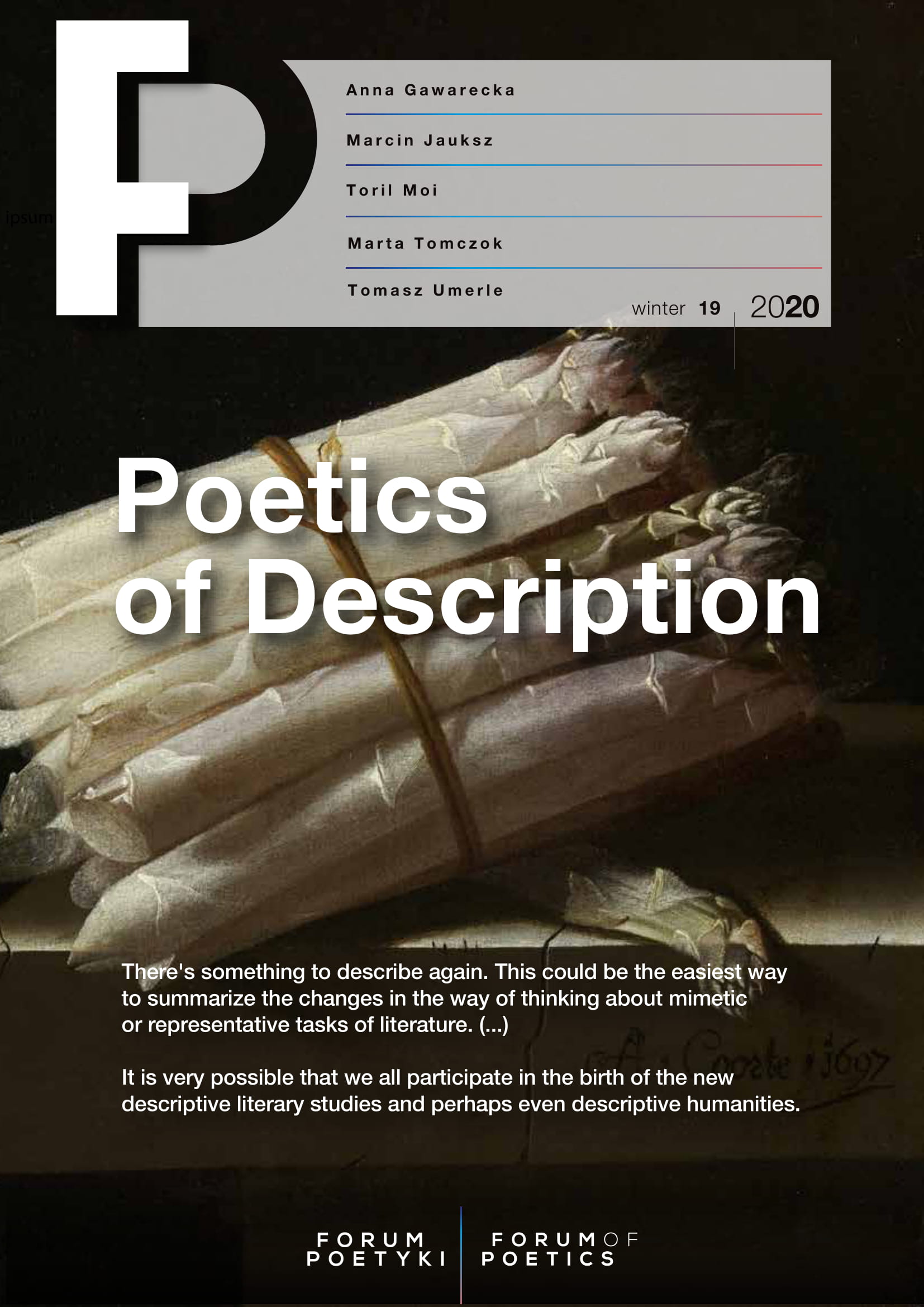 There is something to describe again. This could be the easiest way to summarize the changes in the way of thinking about mimetic or representative tasks of literature. The reality is defined in various ways – speculative, traumatic, experimental, memory, emotional, etc. – and it stands or at least is delirious beyond the record. Thus, description is not only a rhetorical machinery producing an illusory “effect of reality”, according to Roland Barthes’ well-known formula, but it is one of the key components of any linguistic undertaking that tries to describe a certain reality in an inventive way, trying to try to find its peculiar, re-feeling ontology.
There is something to describe again. This could be the easiest way to summarize the changes in the way of thinking about mimetic or representative tasks of literature. The reality is defined in various ways – speculative, traumatic, experimental, memory, emotional, etc. – and it stands or at least is delirious beyond the record. Thus, description is not only a rhetorical machinery producing an illusory “effect of reality”, according to Roland Barthes’ well-known formula, but it is one of the key components of any linguistic undertaking that tries to describe a certain reality in an inventive way, trying to try to find its peculiar, re-feeling ontology.
Recently, Toril Moi also asked for a description as an important research tool (we printed an excerpt from her Revolution of the Ordinary on this subject). There have also been discussions on the meaning of description in various scientific disciplines (initiated by Sharon Marcus, Heather Love and Stephen Best), because it is a scientific procedure that is constantly used in medical, scientific, sociological, and psychological research, among others. This is an important area for recognition of expert literature and linguistics, which all other disciplines must take into consideration.
The issue of the poetics of description is therefore gaining importance as a particularly interesting area of research and development of conceptual ideas. We thus recall in this issue that this topic was carefully studied in the tradition of Central European structuralist research. The classic theoretical findings on this subject were made by Janusz Sławiński, whose contemporary reading is proposed by Gerard Ronge. An interesting recently-published volume of Czech researchers uses the archives of Czechoslovakian structuralism, and at the same time examines the needs of current research on description in multi-media culture (Anna Gawarecka). It develops the issue of description as a component of the poetics of the latest video games (Rafał Kochanowicz). The description also turns out to be very important for research on the possibilities of the digital archiving of literary life documents and other, as Yuri Tynianov would say, literary facts (Tomasz Umerle).
Finally, description becomes a decisive component of those literary texts that deal with the most painful experiences. Karl Ove Knausgård wrote his famous My struggle based on the conviction that it is death that can no longer sustain the thesis about the purely linguistic nature of reality. Therefore, it is worth revisiting an important Polish literary book from the 1990s, Jacek Baczak’s Zapiski z nocnych dyżurów, with his stories about people dying in hospices, for which at that time we probably did not have enough catchy research languages. Perhaps tracing the very poetics of Baczak’s description allows for a better insight into the problems of his touching book (Justyna Szczęsna). This is probably why the bygone, dead world of the Polish provinces of the 1960s and 1970s, shown persistently in the poetry of Piotr Szewc in his surprising form of literary animism, needs a sensitive description so much (Marta Tomczok). It is also worth returning to the golden age of literary description, to the times of the great realistic novel, to see the subtleties of the knowledge of the psychological significance of the description in Bolesław Prus’ The Doll (Marcin Jauksz).
When proposing the topic “poetics of description”, it happened to us as an editorial office for the second time that we provoked unexpectedly numerous reactions from researchers and researchers. We are keen to give this conceptual fervor back, so we have prepared two issues on this subject. It is very possible that we all are participating in the birth of the new descriptive literary studies and perhaps even descriptive humanities.
translated by Agnieszka Kocznur
Table of Contents:
Marta Tomczok, Ontology of Non-modernity in Piotr Szewc’s Poetry
Justyna Szczęsna, “Everything is Worth Describing:” The Case of Jacek Baczak
Tomasz Umerle, Documents of a Literary System as a Subject of Empirical Studies
Gerard Ronge, Towards Expanding a Set of Functions: How to Read Janusz Sławiński’s O opisie





